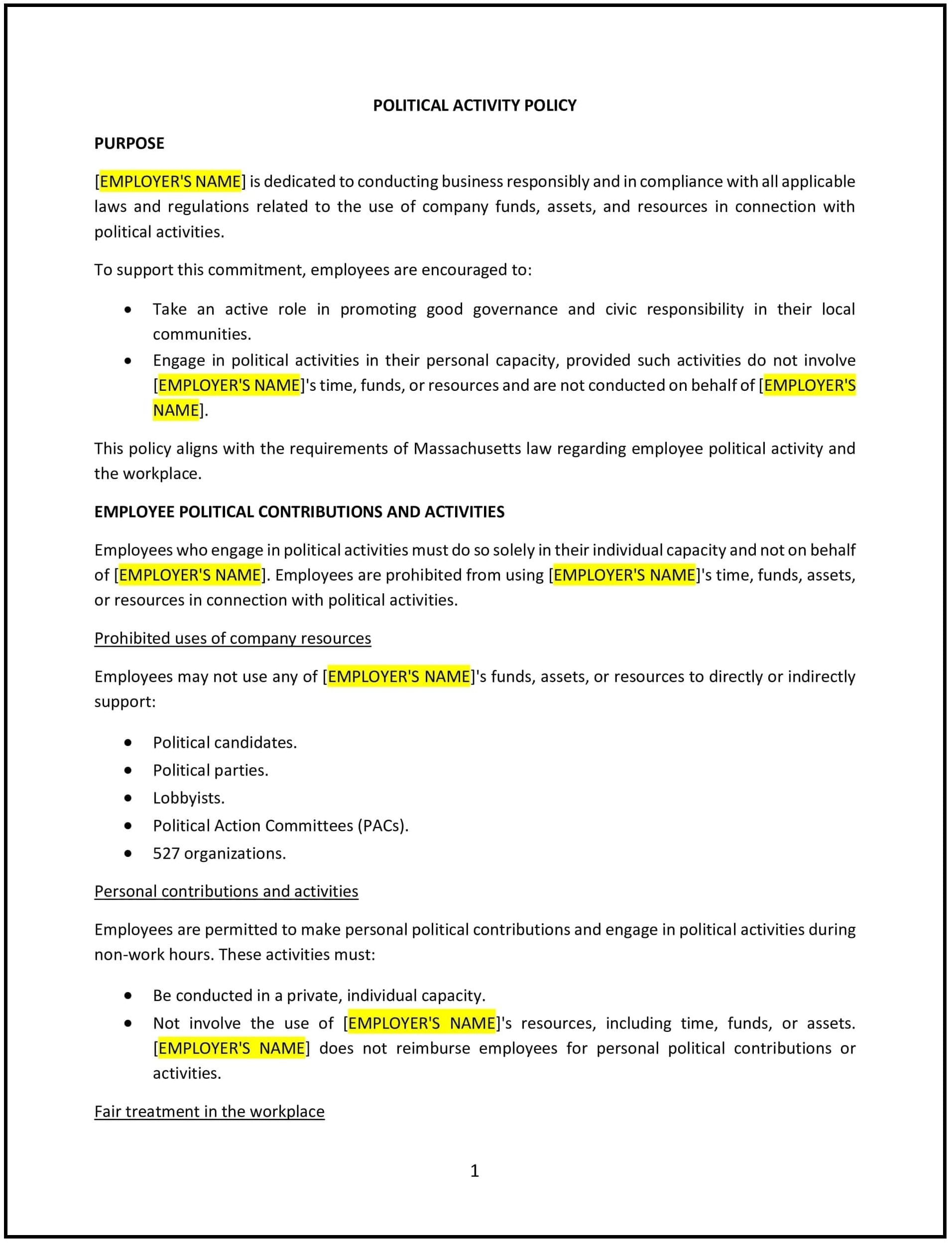Political activity policy (Massachusetts): Free template
Got contracts to review? While you're here for policies, let Cobrief make contract review effortless—start your free review now.

Customize this template for free
This political activity policy is designed to help Massachusetts businesses set clear guidelines regarding employees' participation in political activities, ensuring that it aligns with the company's values and complies with state and federal regulations. The policy outlines acceptable behaviors related to political activities, including participation in campaigns, donations, and other forms of political expression, both on and off the job.
By adopting this policy, businesses can maintain a neutral and respectful work environment while promoting transparency in employees' involvement in political activities and preventing potential conflicts of interest.
How to use this political activity policy (Massachusetts)
- Define acceptable political activities: Specify the types of political activities that are allowed during work hours and those that should be reserved for personal time. This may include activities such as political donations, involvement in campaigns, or political protests. The policy should also clarify whether employees may publicly associate the company with their personal political views.
- Address the use of company resources: Outline the company’s stance on using company resources for political activities, such as using office supplies, email accounts, or social media platforms for political campaigning. Typically, such activities should not interfere with company operations or use company resources without approval.
- Set expectations for political participation during work hours: The policy should clarify whether employees are allowed to participate in political activities during work hours and under what circumstances. If participation is permitted, guidelines should be provided to ensure that work productivity is not impacted.
- Prohibit political discrimination: The policy should clearly state that political beliefs or activities will not be used as a basis for discrimination in hiring, promotions, job assignments, or terminations. Employees should be informed that their political views should not affect their standing within the company.
- Address conflicts of interest: The policy should address how political activities may impact potential conflicts of interest, particularly for employees in decision-making or public-facing roles. Employees should be required to disclose any political involvement that could conflict with the company’s interests or mission.
- Ensure compliance with Massachusetts and federal laws: Ensure that the policy complies with Massachusetts state laws regarding political contributions, campaigning, and employee rights to political participation. The policy should also be aligned with federal regulations, including those that govern political contributions by companies.
- Review and update regularly: Periodically review and update the policy to ensure it is compliant with changes in Massachusetts state laws, federal regulations, and any changes in the company’s approach to political activity.
Benefits of using this political activity policy (Massachusetts)
This policy offers several benefits for Massachusetts businesses:
- Promotes workplace neutrality: The policy helps ensure that the workplace remains neutral, preventing political discussions and activities from affecting work productivity, employee morale, or team dynamics.
- Reduces the risk of conflicts of interest: By outlining clear guidelines, businesses can prevent conflicts of interest between employees’ political activities and the company’s business interests or values.
- Supports compliance with legal requirements: The policy helps the company achieve compliance with Massachusetts state laws and federal regulations regarding political activities, preventing legal complications or violations related to political donations or involvement.
- Protects employee rights: The policy helps protect employees' rights to participate in political activities outside of work while preventing retaliation or discrimination based on political views.
- Promotes transparency: Clear guidelines for political activity create transparency regarding acceptable behaviors, reducing the risk of misunderstandings or disputes among employees or management.
- Enhances company reputation: A clear political activity policy demonstrates the company’s commitment to maintaining a respectful and professional work environment, which can enhance its reputation as a fair and ethical employer.
Tips for using this political activity policy (Massachusetts)
- Communicate the policy clearly: Ensure that all employees are aware of the political activity policy and understand the expectations around political participation. Include the policy in the employee handbook and discuss it during onboarding or team meetings.
- Train managers on the policy: Train managers to ensure that they understand the policy and can handle political activity-related issues or questions from employees. Managers should be equipped to address concerns and enforce the policy fairly and consistently.
- Monitor political activity in the workplace: While employees are free to participate in political activities outside of work, monitor any activities within the workplace that could disrupt operations or create a hostile environment. Ensure that the policy is followed, and address any violations promptly.
- Respect employees' rights: While the company has a right to manage political activities within the workplace, ensure that employees' rights to political expression are respected outside of work. The policy should make it clear that personal political views will not impact their standing in the company.
- Review and update regularly: Periodically review the policy to ensure it is compliant with Massachusetts state laws, federal regulations, and evolving business practices. Update the policy as necessary to address any new legal requirements or changes in company operations.